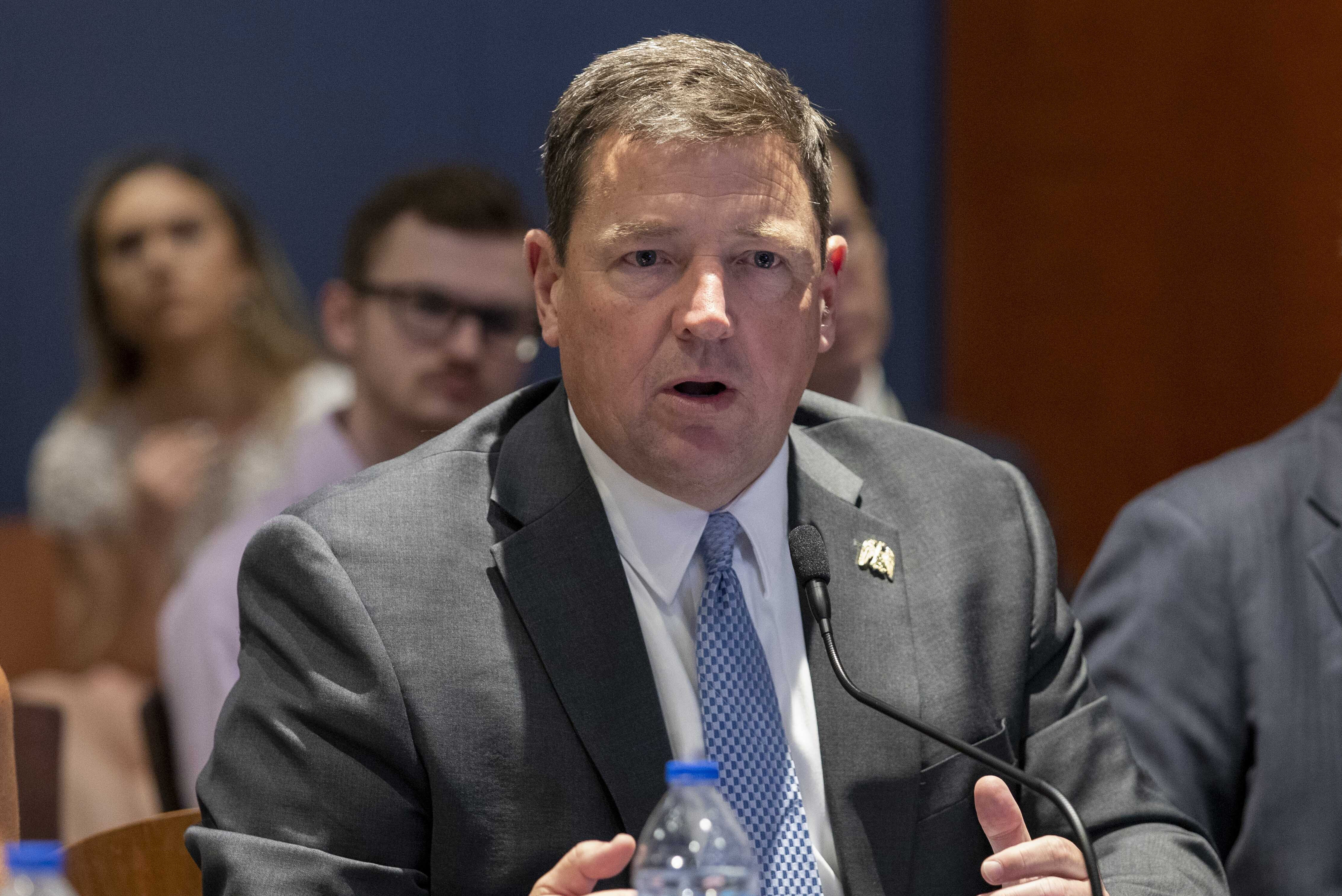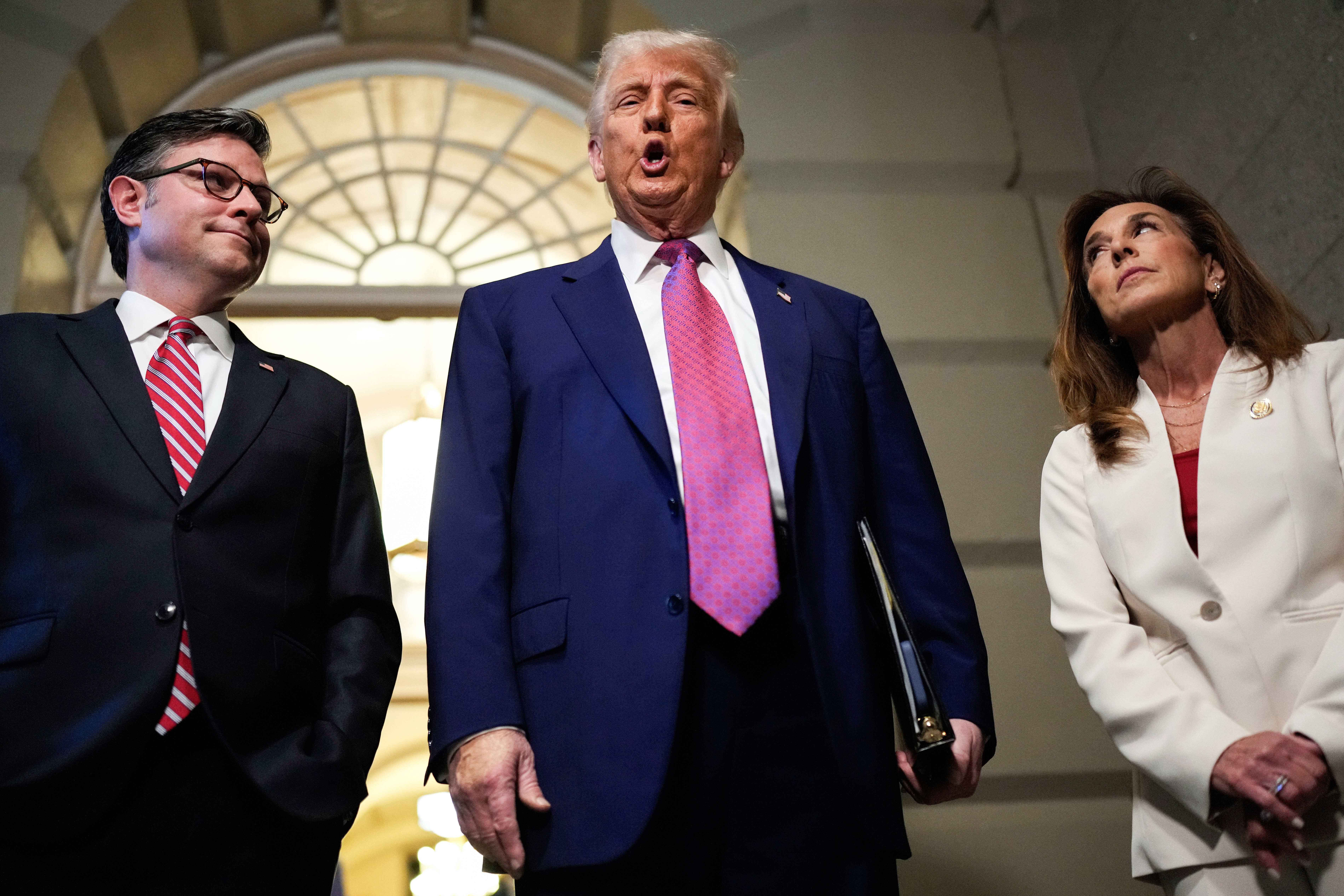Donald Trump leaned into a full-scale assault on the legitimacy of Joe Biden’s presidency on Tuesday.
As his predecessor’s political sphere reels from the lead-up to Tuesday’s release of Original Sin, a book documenting the cover-up of his decline, Trump is seizing the advantage.
Following a brief moment of unity during which the Washington elite came together and wished Biden a speedy and full recovery, the president’s allies began a new task: undermining Biden’s legacy.
Revelations in Original Sin about the former president’s periodic memory lapses and moments where he seemed to freeze up or lose track of where he was have aided their cause. So have the continued efforts of Democrats close to Biden to spin the narrative: with the book’s publication, a handful have rejected the integrity of its reporting and insisted they saw no decline in the president’s mannerisms. Republicans are capitalizing on a widening trust gap between the Democratic Party’s elite and their typical voters.
At the Capitol early Tuesday morning, he told reporters that the federal government was “illegally run” under Biden: “We had a president that didn’t sign anything.”
“Who was operating the autopen? This is a very serious thing,” Trump said. “You know who signed it? Radical Left lunatics that were running our country and the auto pen signed it, and they didn’t want him, and they were disappointed in getting him, because they wanted Bernie Sanders.”

He’d previously declared in March, on Truth Social, that pardons issued by the former president for his son Hunter and others including members of the January 6 commission were “null” and “void”, due to Biden’s use of an “autopen” to add his signature to the documents.
As with nearly anything the president says publicly, there are unspoken facts that undermine his position: there’s no constitutional authority allowing a president to nullify pardons issued by a predecessor, and autopens were approved for usage by the president by the Justice Department before Biden ever took office.
Yet Republicans are eagerly turning the issue of Biden’s pardons into a political football, even if they lack the authority to do anything about them. James Comer, GOP chair of the House Oversight Committee, has vowed that he will launch an investigation while Ed Martin, Trump’s new pardons attorney, has promised the same.
Martin, who was appointed to the role after opposition to his support for January 6 rioters tanked his nomination to be US attorney for the District of Columbia, told reporters at a press conference during his last day as acting attorney for the city that Biden’s pardons “need some scrutiny”.
“They need scrutiny because we want pardons to matter and to be accepted and to be something that’s used correctly. So I do think we’re going to take a hard look at how they went and what they did,” said Martin.

While the president’s plans to nullify Biden’s pardons will go nowhere, he will likely succeed at his secondary goal: the continued undermining of his main rival and the development of an image of Biden as completely managed by handlers and aides. His administration’s release of the audio recording of Biden’s testimony to Robert Hur on Friday, days before the release of Original Sin and amid a flurry of headlines about its excerpts, is not a coincidence.
There likely isn’t much room or political upside for Biden’s closest advisers to change their tune now. But younger Democrats can and have already begun to come out and say that it was a mistake for the president to rob his party of a primary in 2024 and stand for re-election. Ro Khanna, a congressman from California, did so last week while other Democrats are facing increasingly tough questions on the matter. Biden’s ambassador to Japan, former White House chief of staff Rahm Emanuel, admitted to journalist Tara Palmieri this week that he came to the same conclusion.
“I don’t think it was a cover-up … but I do think that the advisers and people close to Joe Biden owe an explanation … What I don’t think the Democratic Party can do is just say, ‘Let’s talk about the future. Let’s move past this,'” Khanna told ABC News’ This Week on Sunday.
“Look I made a mistake … you have to own up before you can move forward,” Khanna said of his own past defenses of the president’s fitness for office.
The timing of the book’s release is particularly suitable for Republicans, who are looking for something — anything — to distract from two problematic stories of their own making. The House of Representatives was set to vote Wednesday at 1:00 a.m. on whether or not to advance Republicans’ spending bill to the full floor, where Speaker Mike Johnson wants a vote later in the day.
The early-morning vote is likely to succeed, but Johnson has not yet managed to strike a deal between conservative deficit hawks and center-right members of the so-called “SALT caucus”. Members of both groups are threatening to tank the bill if it does not comply with their standards.

Meanwhile, Trump himself dragged Congress into a new realm of uncomfortable questions centered around his decision to accept a $400m upgrade to Air Force One as a gift from the Qatari royal family. Reports of the deal claim that the jet will be transferred to Trump’s presidential library upon the end of his term, while administration officials insist that it is a gift to the Department of Defense. As it stands, it’s uncertain whether Trump himself will retain access after the end of his presidency.
In a closed-door meeting with Republicans on Tuesday, Trump urged his party’s House caucus to unify behind the budget reconciliation bill — though members told reporters afterwards that he had likely failed to sufficiently narrow the gulf. Passage of the full bill by the House on Wednesday would be a major milestone in the overall reconciliation process, through which Republicans hope to deliver on key priorities for the president: extension of the 2017 tax cuts, and expansion of border security measures.
And he offered one stark warning to his party that is likely to infuriate deficit hawks who see Medicaid as the only source of funding to reach their targets for spending cuts: “Don’t f*** around with Medicaid.”

